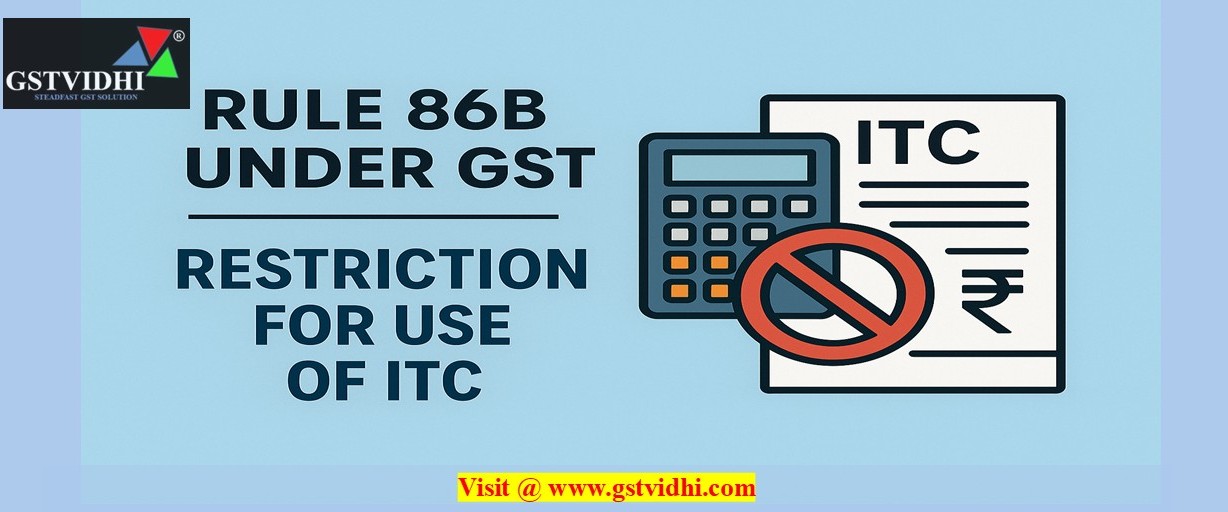
Rule 86B Under GST (Rajasthan AAR Ruling) – Cumulative Income
Tax of Firm and Partners Not Eligible for Rule 86B Exemption
Introduction: In
a critical interpretation of Rule 86B of the CGST Rules, the Rajasthan
Authority for Advance Ruling (AAR) has ruled that the cumulative income tax
paid by a partnership firm and its partners cannot be clubbed for the
purpose of claiming exemption from the restrictions imposed by Rule 86B. The
ruling came in the case of M/s Aadinath Agro Industries, a spice
processing firm with monthly taxable turnover exceeding ₹50 lakhs.
Case
Details
- Applicant:
M/s Aadinath Agro Industries
- AAR Order No.:
RAJ/AAR/2025-26/53
- Date of Ruling:
23rd May 2025
- Authority:
Rajasthan AAR
Issues
Raised by the Applicant
The applicant sought an
advance ruling on the following questions:
1. Whether
the total income tax paid by the firm and its partners cumulatively can
be considered for the exemption under Rule 86B?
2. If
no individual partner paid over ₹1 lakh in income tax, but the firm
and partners together paid more than ₹1 lakh, would that qualify for
exemption under Rule 86B?
Applicant’s
Submissions
The applicant contended
that:
- The firm and its partners are financially
interdependent and operate as a single economic unit.
- The total income tax paid
collectively exceeds ₹1 lakh across the last two financial years.
- The interpretation of Rule 86B should
focus on substance over form, and the exemption should be granted based
on collective tax credibility.
- Section 40(b)
of the Income Tax Act already recognizes partner remuneration and interest
on capital as individually taxable.
- The restriction imposed by Rule 86B
affects working capital and creates unnecessary hardship for genuine,
tax-compliant businesses.
- The rule should be interpreted liberally
in line with its intent — to curb fraud, not burden legitimate
taxpayers.
Legal
Background – Rule 86B
Rule 86B
restricts the use of ITC to discharge output tax liability beyond 99% if
taxable turnover exceeds ₹50 lakh in a month.
Exemption Clause (Clause
a):
The restriction does not
apply if:
“The person or the
proprietor or Karta or the Managing Director or any of its two partners… have
paid more than ₹1 lakh as income tax under the Income-tax Act, 1961 in each of
the last two financial years…”
Authority’s
Observations
- The applicant admitted that no
individual partner or the firm has paid ₹1 lakh or more in
income tax in each of the last two financial years.
- The combined amount of income
tax paid by the firm and partners was above ₹1 lakh (FY 2022–23 and FY
2023–24), but individually no entity crossed the ₹1 lakh threshold.
- The wording of Rule 86B is clear
and unambiguous — it requires any of two partners or specified
persons to individually meet the income tax threshold.
- There is no legal basis to
permit cumulative computation for exemption under Rule 86B.
- A partnership firm and its partners
are distinct persons for income tax purposes under Indian law.
Final
Ruling
|
Question
|
Ruling
by AAR
|
|
Can
total income tax paid by the firm and partners be considered for Rule 86B
exemption?
|
No.
Exemption applies only if any individual (firm or two partners) meets
the ₹1 lakh tax threshold separately.
|
|
Does
the exemption apply if cumulative tax exceeds ₹1 lakh but no single partner
paid that much?
|
No.
The wording of Rule 86B(a) does not allow cumulative tax
consideration.
|
Thus, the restriction
under Rule 86B applies to M/s Aadinath Agro Industries, and they must
discharge at least 1% of output tax liability in cash, even if
sufficient ITC is available.
Conclusion
The Rajasthan AAR has
made it clear that Rule 86B exemption is only available when specified
individuals (not in aggregate) meet the income tax criteria. This judgment
underscores the importance of clear income tax disclosures by firms and
their partners if they wish to avail themselves of cash flow flexibility under
GST.
Disclaimer: All the Information is based on the notification, circular advisory and order issued by the Govt. authority and judgement delivered by the court or the authority information is strictly for educational purposes and on the basis of our best understanding of laws & not binding on anyone.
Find the Attachment (Press on Click Here )
Click here